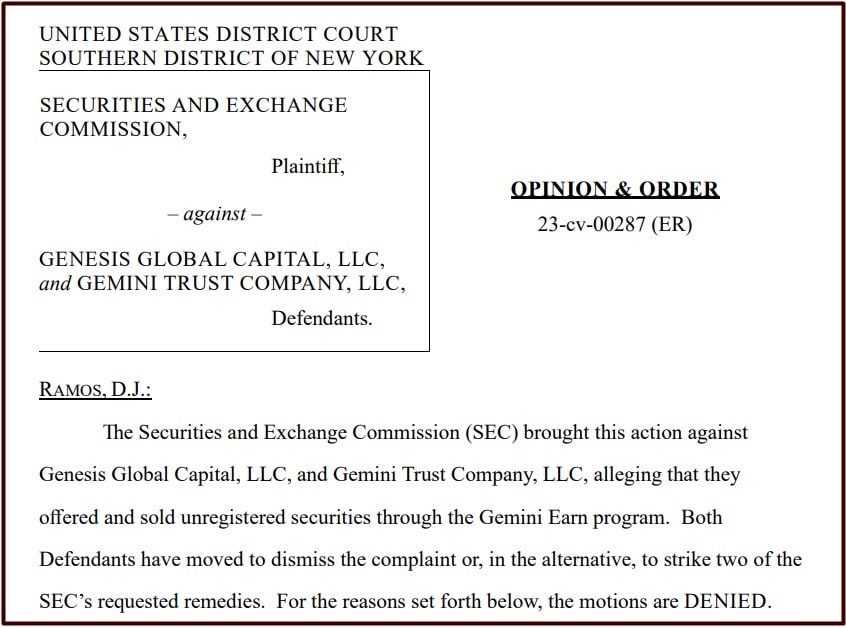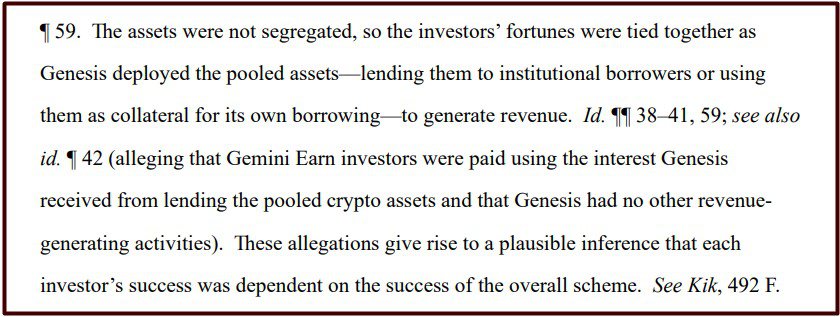
Key Takeaways:
- Judge Edgardo Ramos ruled that the SEC’s lawsuit against Gemini and Genesis can proceed, finding the allegations that the Gemini Earn program constituted an unregistered securities offering plausible.
- The SEC’s case hinges on the Howey test for defining securities, with the judge agreeing that Gemini Earn likely met these criteria due to Genesis’ management of pooled assets and the reliance on its efforts for profits.
- Despite Genesis’ agreement to settle with the SEC for $21 million amidst bankruptcy proceedings, the case’s progression underscores ongoing regulatory scrutiny of crypto products and the implications for the broader cryptocurrency market.
A federal judge, Edgardo Ramos, has upheld the Securities and Exchange Commission’s (SEC) allegations as sufficiently credible to keep the lawsuit against crypto firms Gemini and Genesis moving forward.
This decision came after assessing the SEC’s claim that the Gemini Earn program constituted an unregistered securities offering.
In a detailed 32-page order issued on March 13, Judge Ramos from the New York District Court dismissed attempts by Gemini and Genesis to halt the SEC’s lawsuit against them.

Additionally, a request to prevent the SEC from stopping their securities sales and to force them to relinquish profits from the Gemini Earn program, should the SEC emerge victorious, was also denied.
The heart of the SEC’s lawsuit, filed in January 2023, argues that Gemini Earn, a crypto yield-bearing product offered by Gemini and managed by Genesis, involved the offering and sale of unregistered securities. The judge concurred, highlighting that the SEC had adequately demonstrated Gemini Earn’s alignment with the criteria of an investment contract as per the Howey test, a benchmark for identifying securities.
Judge Ramos pointed out that Genesis aggregated assets on its balance sheet without segregation, extending these funds to institutional borrowers based on its discretion, which meant that customers’ profit expectations were tied to Genesis’ efforts.

Additionally, the judge found that the SEC’s portrayal of Gemini Earn agreements as notes, which obligate repayment of loans with interest, was plausible.
This doesn’t translate to an outright victory for the SEC yet; it simply means the lawsuit will proceed into the evidence-gathering phase, requiring the regulator to substantiate its allegations.
In a twist preceding the lawsuit, Genesis, amidst the lawsuit’s backdrop, announced a settlement agreement with the SEC in a bankruptcy court filing last month, agreeing to a $21 million settlement. This legal action unfolds in the wake of the November 2022 report, highlighting approximately 340,000 customers and $900 million in assets under management within Gemini Earn, just as the FTX’s bankruptcy sent shockwaves through the industry.
In response, Genesis momentarily paused withdrawals from Gemini Earn, citing severe market turmoil and liquidity crunches. Following the SEC’s lawsuit, Genesis declared bankruptcy in January of the following year.
In a subsequent move, Gemini agreed to a deal to return $1.1 billion to Gemini Earn customers through Genesis’ bankruptcy proceedings, brokered with New York’s financial regulator.

